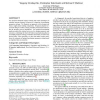Free Online Productivity Tools
i2Speak
i2Symbol
i2OCR
iTex2Img
iWeb2Print
iWeb2Shot
i2Type
iPdf2Split
iPdf2Merge
i2Bopomofo
i2Arabic
i2Style
i2Image
i2PDF
iLatex2Rtf
Sci2ools
94
Voted
SIGECOM
2006
ACM
2006
ACM
Empirical mechanism design: methods, with application to a supply-chain scenario
Our proposed methods employ learning and search techniques to estimate outcome features of interest as a function of mechanism parameter settings. We illustrate our approach with a design task from a supply-chain trading competition. Designers adopted several rule changes in order to deter particular procurement behavior, but the measures proved insufficient. Our empirical mechanism analysis models the relation between a key design parameter and outcomes, confirming the observed behavior and indicating that no reasonable parameter settings would have been likely to achieve the desired effect. More generally, we show that under certain conditions, the estimator of optimal mechanism parameter setting based on empirical data is consistent. Categories and Subject Descriptors I.6 [Computing Methodologies]: Simulation and Modeling; J.4 [Computer Applications]: Social and Behavioral Sciences—Economics General Terms Algorithms, Economics, Design Keywords Empirical Mechanism Design, Game T...
Related Content
| Added | 14 Jun 2010 |
| Updated | 14 Jun 2010 |
| Type | Conference |
| Year | 2006 |
| Where | SIGECOM |
| Authors | Yevgeniy Vorobeychik, Christopher Kiekintveld, Michael P. Wellman |
Comments (0)

